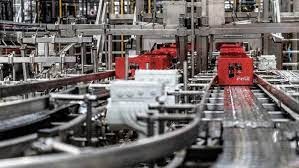ISLAMABAD: The government is taking multiple steps to establish new industries, promote the “made in Pakistan” concept and enhance export and employment opportunities in the country, WealthPK reports.
According to an official document, a copy of which is available with WealthPK, the government has already formulated and implemented the policies including Mobile Device Manufacturing Policy and Auto Industry Development and Export Policy (2021-26) in recent years to promote industrialisation in the country.
Under Mobile Device Manufacturing Policy, 30 industrialists have been issued licences to start local manufacturing of mobile phones while under Auto Development Policy (2016-21), a number of new entrepreneurs have started manufacturing and assembling new brands of vehicles.
The manufacturers of electric vehicles including electric bikes and rikshaws have invested in the sector because the government’s policy offers various incentives to them in taxes and duties, etc.
The “green field technology” is another initiative of the government for both import substitution and export enhancement. Under the scheme, different incentives in terms of taxes and duties are given by the Federal Board of Revenue (FBR) to the companies, which bring new technologies that can introduce innovative product design and reduction in the cost of production.
The green field licences are recommended by Engineering Development Board (EDB) to such companies after the physical verification of their manufacturing facilities. EDB has already approved nine cases of green field status under SRO 887 and SRO 777.
The document says that EDB is in process of formulating a number of policies to promote local production and export. These policies include Solar Panel Manufacturing Policy, Agricultural Implements Manufacturing Policy and Steel and Petrochemicals policy among others.
EDB is also working in close liaison with industrialists for local manufacturing of import substitution products, especially engineering goods through reverse engineering, which will open more avenues for industrialisation besides creating employment opportunities in the country.
EDB is facilitating businesses to increase production and exports. Under these policies, EDB is also involved in the annual budget exercise to help the engineering industry by rationalising the cost of doing business under the principles of cascading tariff regime.
Under the export facilitation scheme of the government, the duties and taxes on the import of raw materials and components have already been abolished. The exporters, who don’t get incentives under the scheme, are facilitated by providing Duty Draw Back (DDB) on their inputs used for the manufacturing of exportable products.
In order to export the value-added goods, EDB is working in coordination with the Ministry of Commerce to revise the rates of Draw Back on Local Taxes and Levies (DLTL).
The report says that to enhance the production of export-quality goods, EDB has conducted detailed studies to increase the competitiveness of the domestic fan industry and surgical instrument industry of Pakistan. A study on the cutlery industry is in the pipeline. The government pursues the recommendations of the reports for enforcement.
It says that EDB publishes an exporter directory after every two years that is widely circulated locally as well as internationally to increase awareness about Pakistan’s export potential companies and their products.
In order to enhance exports, create employment opportunities and earn foreign exchange for the country, the Export Processing Zone Authority (EPZA) management has set an additional target of 15%, in addition to their own set targets, for all units operating in EPZs of the country to back the government’s drive to enhance exports.
It says that EPZA has contributed $24.088 million to the government’s exchequer on account of presumptive tax duly collected from investors during the last three years.
Presently, there are more than 40,000 workers employed at all EPZs of the country with the addition of 5,000 more labourers. Among them, 70% are female workers engaged in different operating units in EPZs.
Small and Medium Enterprises Development Authority (SMEDA) is also an advisory body for the government. It facilitates other stakeholders in addressing their SME development agendas.
According to the latest Economic Survey of Pakistan, the industrial sector grew by 7.2% and other components of manufacturing, small scale and slaughtering grew by 8.9% and 6.2%, respectively.
The construction industry experienced a moderate gain of 3.1%. This demonstrates that deindustrialisation had no alarming effect on the expansion of industrialisation in the country.
Trade Development Authority of Pakistan is also promoting the “made in Pakistan” concept. To enhance employment opportunities in the country, the government has already launched initiatives including Skill Development and Kamyab Jawan besides flagship programmes, according to the document available with WealthPK.






